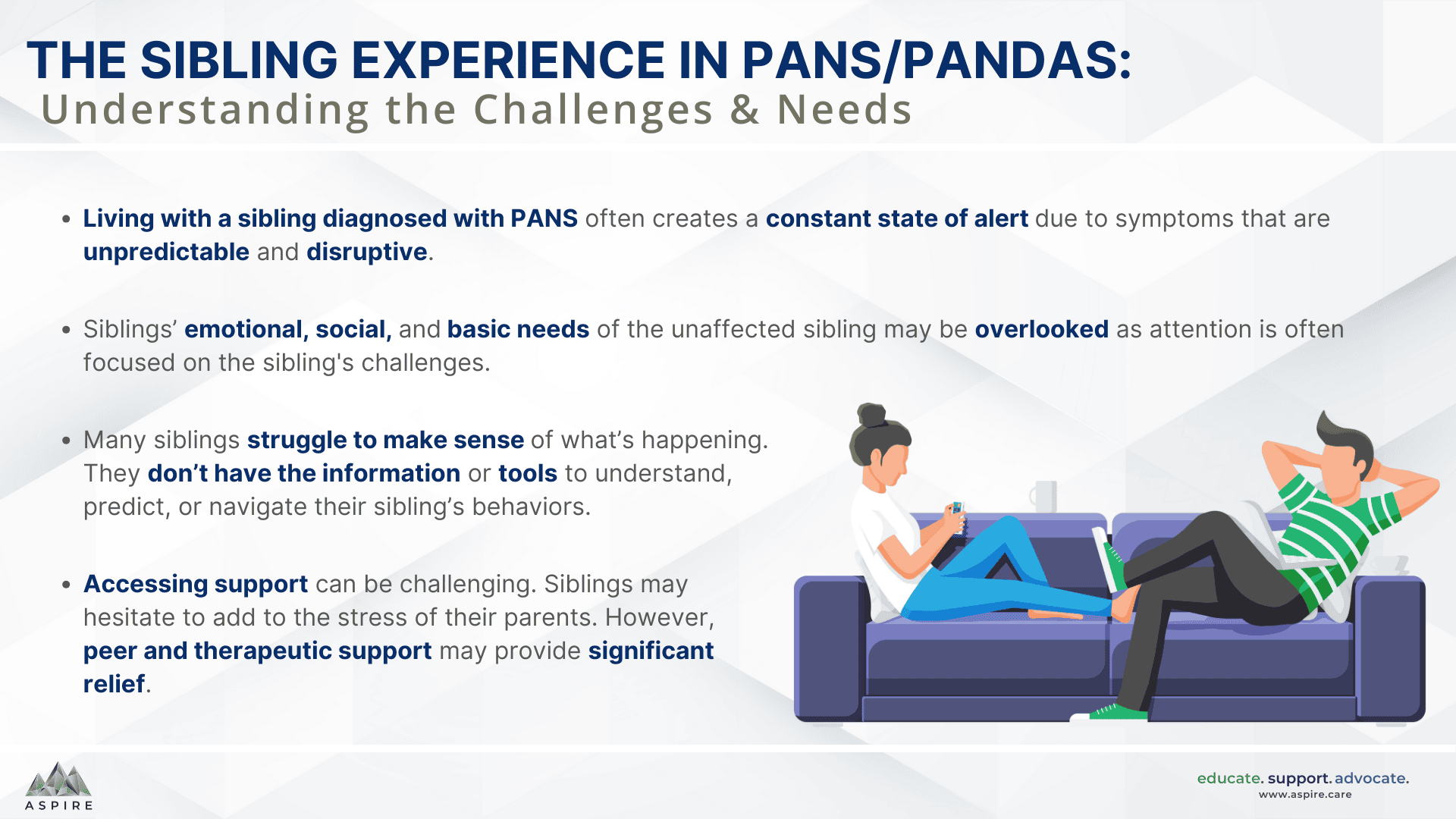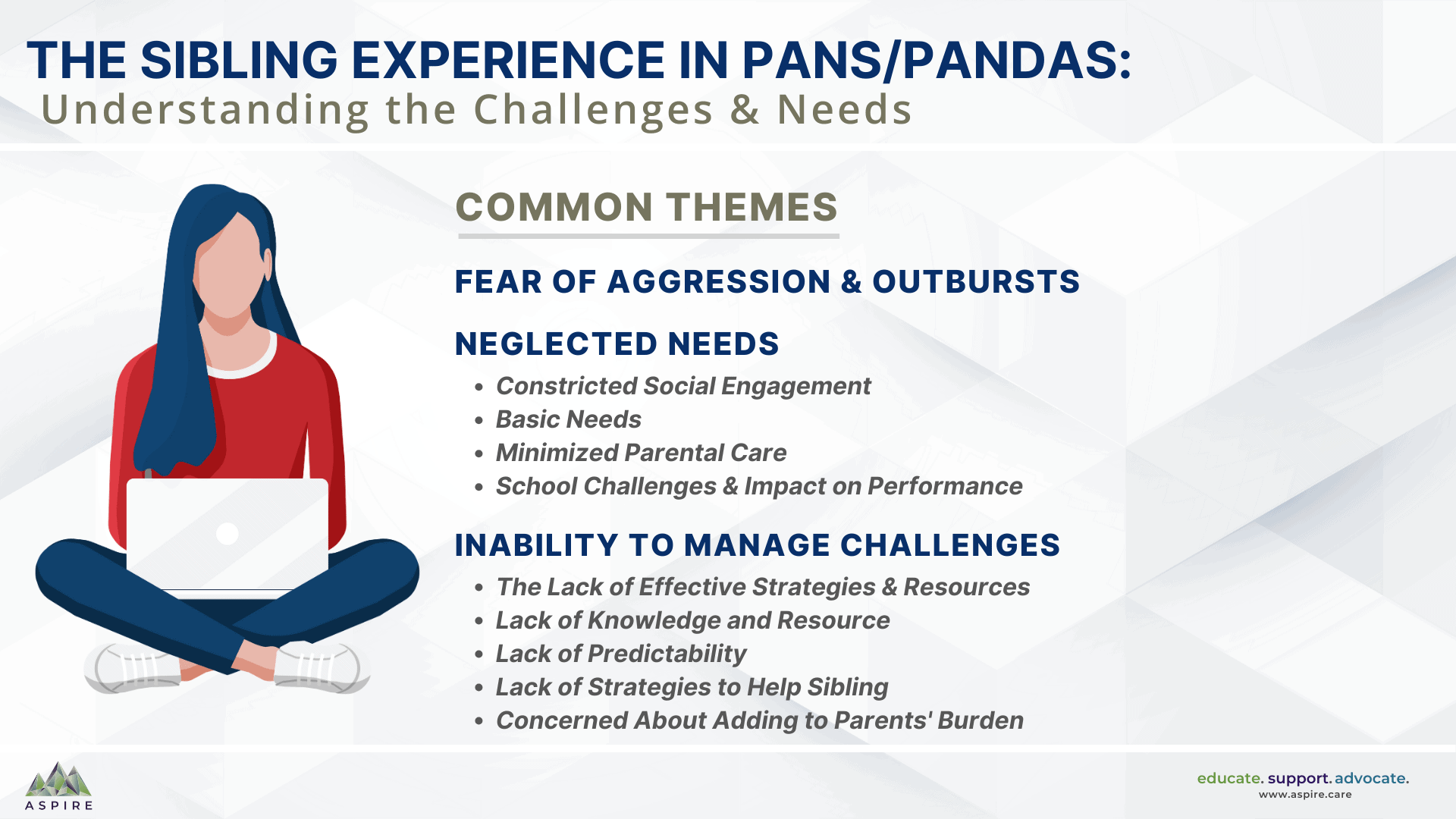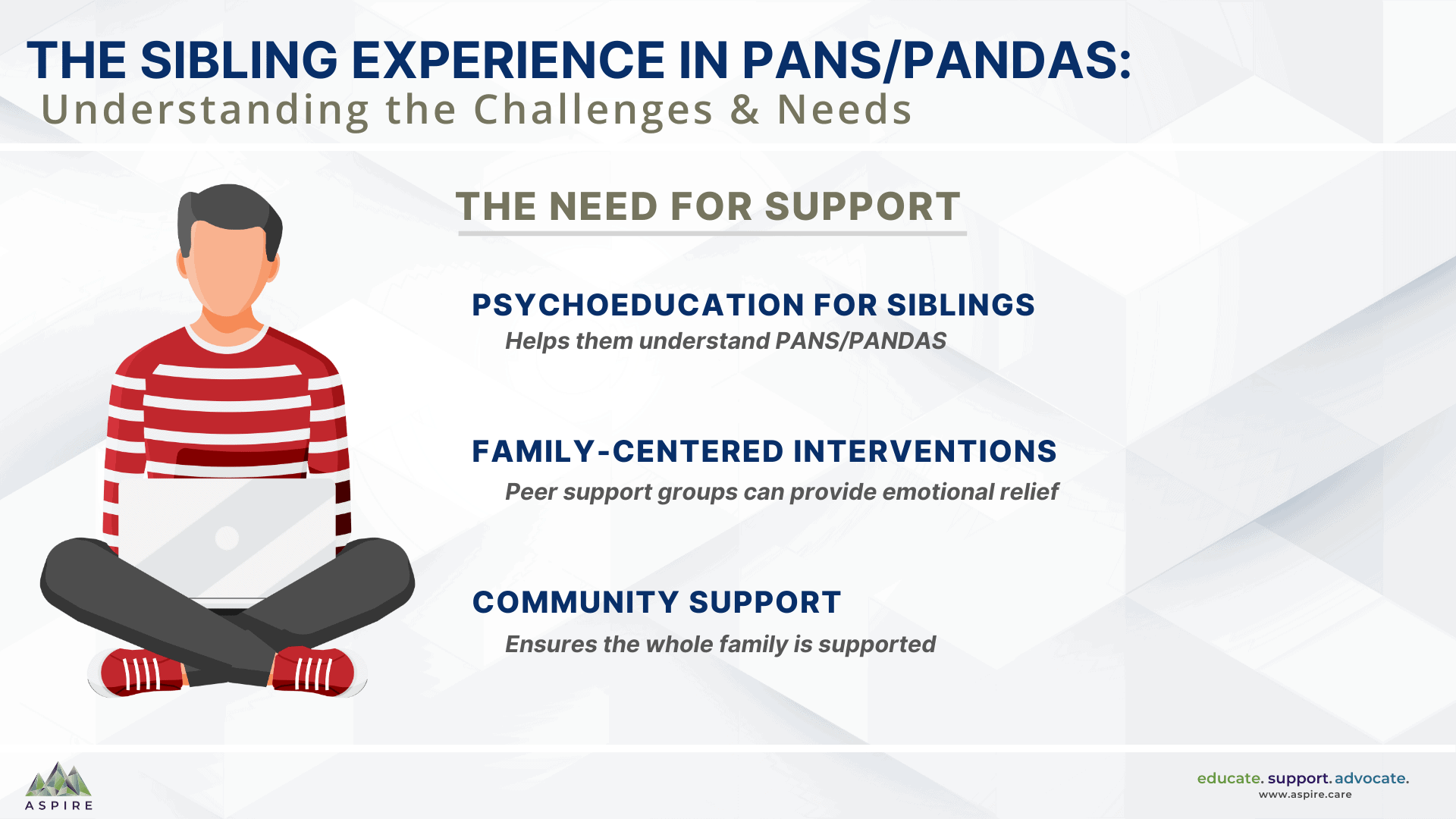Living with a sibling affected by PANS profoundly impacts well-being—fear of outbursts, limited social opportunities, and the isolation of not having the words or knowledge to explain the condition. They face significant emotional, psychological, and social challenges due to the unpredictable nature of the illness and the lack of comprehensive support systems. These struggles often go unnoticed and under-addressed, particularly because PANS/PANDAS remains a relatively unfamiliar diagnosis to both the public and healthcare professionals. Much like parents of children with PANS/PANDAS, siblings may experience chronic stress, exhaustion, and a sense of walking on eggshells, always bracing for the next unexpected challenge. The absence of clear patterns in their sibling’s symptoms and disease course makes it difficult to develop coping strategies, further contributing to feelings of helplessness and frustration.
The PANS/PANDAS community truly needs a robust support system. Community-based care and more accessible resources are essential for siblings and families. Just as psychoeducation for parents is a vital part of managing PANS, providing support for siblings—through both formal and informal networks—can help reduce the psychological stress they face. Without holistic, community-based care, families must assemble comprehensive support from a range of resources, piecing together the necessary care for the affected child and their siblings.
- Living with a sibling diagnosed with PANS often creates a constant state of alert due to symptoms that are unpredictable and disruptive.
- Siblings’ emotional, social, and basic needs of the unaffected sibling may be overlooked as attention is often focused on the sibling’s challenges.
- Many siblings struggle to make sense of what’s happening. They don’t have the information or tools to understand, predict, or navigate their sibling’s behaviors.
- Accessing support can be challenging. Siblings may hesitate to add to the stress of their parents. However, peer and therapeutic support may provide significant relief.
For families seeking more practical guidance on how to support siblings, ASPIRE offers two valuable resource articles: Sibling Support and Therapy for Siblings of Children with PANS/PANDAS.
Key Themes of Having a Sibling with PANS/PANDAS
Neglected Needs
A recurring theme among siblings is the neglect of their own basic, emotional, and social needs. Many put aside their own emotional and physical needs, prioritizing their sibling’s struggles over their own well-being. Some siblings may choose to remain out of sight, attempting to avoid contributing to the existing stress in the household. These experiences highlight the significant emotional toll on siblings, often leaving them alone to cope with their challenges.
- Basic Needs: The primary reasons for these difficulties are the affected sibling’s symptoms, particularly OCD, anxiety, and aggressive behaviors, which often dictate the family’s routines. Parents frequently ask the sibling to wait or adjust to accommodate the needs of the child with PANS. In other instances, siblings make these adjustments independently, recognizing that their needs can only be met once their sibling is calm. Over time, this leads to a pattern of self-sacrifice, where siblings learn to suppress their needs to maintain household stability.
- Minimized Parental Care: Siblings express their parents are often unavailable to meet their needs, both in practical and emotional ways. More profoundly, they often feel the absence of emotional support—parents aren’t there to celebrate achievements, offer encouragement, or provide comfort during difficult times.
- School Challenges and Impact on Performance: Distress over one’s and one’s family’s well-being can make it hard to focus on studies. Sibling outbursts disrupt their study environment, and those attending the same school face challenges participating in activities due to a sense of responsibility to manage their siblings’ issues.
- Constricted Social Engagement: Siblings often find it difficult to invite friends over, as the unpredictable behavior of their ill sibling makes hosting social activities impossible. A decreased inability to spend quality leisure time with family or friends significantly impacts these siblings’ social quality of life. Siblings face disappointment as plans for family activities are often canceled due to their sibling’s condition. Even when outings happen, stress and unpredictability overshadow the experience, making family time more overwhelming than enjoyable.
Fear of Aggression & Outbursts
Many siblings of children with PANS live in fear of aggressive outbursts, which can be physical or verbal. Various conditions share this fear, including ADHD, but the intensity of the symptoms in PANS adds another layer of stress, making siblings feel unsafe in their own homes.
Inability to Manage Challenges
- The Lack of Effective Strategies & Resources: Siblings feel unequipped to deal with the challenges they face. These feelings of helplessness and lack of resources underscore the urgent need for comprehensive support that goes beyond the immediate care of the child with PANS. By addressing these gaps in support, we can offer siblings the tools and understanding they need to cope more effectively with their unique challenges.
- Lack of Knowledge and Resources: The unfamiliarity of the PANS diagnosis makes it hard for them to explain their sibling’s behaviors to others, contributing to isolation and confusion. Unlike more recognized conditions like ADHD, where there is a broader understanding in the community, PANS remains a relatively new and poorly understood diagnosis by too many. This gap in knowledge among peers, schools, and even healthcare providers left siblings without the resources they needed to cope.
- Lack of Predictability: The unpredictability of a sibling’s behaviors creates a constant state of hypervigilance, leaving siblings feeling on edge and unable to relax in their own home. They struggle with the lack of control over their environment, never knowing when an outburst, meltdown, or sudden shift in mood might occur. This uncertainty affects their emotional well-being, as they often feel powerless to prevent or de-escalate situations.
- Lack of Strategies to Help Sibling: In addition to the emotional strain, many siblings feel a deep sense of helplessness when it comes to managing their sibling’s symptoms. During flare-ups, they often feel powerless, unable to find strategies that effectively alleviate the situation. This lack of tools to help their sibling only intensifies the stress, making it harder to offer the support that might ease the family’s challenges.
- Concerned About Adding to Parents’ Burden: Many siblings know their parents are overwhelmed by the demands of caring for their sibling with PANS, making them hesitant to ask for support themselves. They may worry that voicing their own needs would add to their parents’ emotional burden, potentially making them feel guilty or sad. This perception creates a sense of isolation, as these siblings often refrain from seeking help.
The Need for Support
There is a critical need for family-centered interventions and increased awareness about PANS. Given that siblings often feel isolated and unsupported, there is a clear need for psychoeducational programs that involve the entire family—not just the affected child.
For families seeking more practical guidance on how to support siblings, ASPIRE offers two valuable resource articles: Sibling Support and Therapy for Siblings of Children with PANS/PANDAS. These articles provide further insights into strategies to improve their overall well-being and how therapy can help siblings cope with the emotional and social stress of living with a sibling affected by PANS/PANDAS. We encourage you to explore these resources for more information and practical steps to support your family.
- Psychoeducation for Siblings: Family-based psychoeducation and intervention programs could help siblings better understand the condition and offer strategies for coping with stress brought on by PANS/PANDAS. Moreover, acknowledging the gaps in scientific knowledge about PANS is important to avoid overburdening siblings with expectations for understanding something that even professionals are still learning about.
- Community Support: While support for siblings is limited, some find comfort in sibling-to-sibling connections as peers can offer emotional support through shared understanding and compassion. Unfortunately, accessing these connections remains challenging due to a lack of resources. Multi-professional support, including timely interventions, can also help siblings cope with their unique challenges. Organizing sibling support groups within healthcare settings or community spaces could provide a network of understanding and relief for those who feel isolated by their experiences.
- Family-Centered Interventions: A family-centered approach is essential when managing PANS. The impact of PANS extends beyond the immediate family, affecting siblings’ social relationships, school life, and mental well-being. Healthcare providers should broaden support services to include siblings and extended family members, such as grandparents. Interventions should address the needs of all family members, ensuring they receive the support required for their unique roles and experiences.
In Summation
Siblings of children with PANS face significant and unique challenges, from living with the fear of unpredictable symptoms like aggression, OCD, and anxiety to experiencing neglect and isolation. These challenges underscore the need for targeted support, not only for the affected child but for the entire family. Since family-centered interventions are not yet widely available, it is crucial for families to recognize and address the common areas of neglect we’ve discussed. In addition, building a supportive team of providers who can assist siblings is vital. By prioritizing the needs of siblings and seeking out resources and support, families can better navigate the emotional and social stress of living in a home affected by PANS/PANDAS.
Source: Ringer, N., Zakirova-Engstrand, R. Experiences of Siblings of Children with Pediatric Acute-Onset Neuropsychiatric Syndrome (PANS). J Child Fam Stud (2025). https://doi.org/10.1007/s10826-025-03030-1
Additional ASPIRE Resources
Sibling Support
Growing up with a sibling who has PANS/PANDAS comes with unique challenges. From navigating unpredictable behaviors to feeling overlooked, many siblings struggle to find the support they need. This guide offers practical strategies to help families ensure siblings feel heard, supported, and included.
Therapy for Siblings of Children with PANS/PANDAS
Siblings of children with PANS/PANDAS often carry emotional burdens that go under-supported. Therapy can provide them with the tools to process their experiences, build resilience, and develop healthy coping strategies. Learn how therapy can support siblings and foster emotional well-being.
🔗 Therapy for Siblings of Children with PANS/PANDAS


